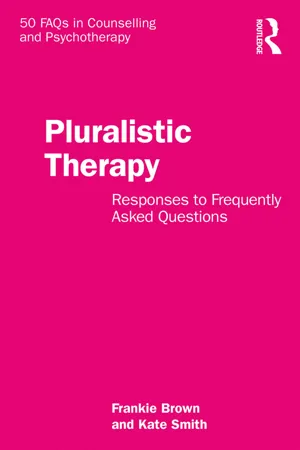
- 280 pages
- English
- ePUB (mobile friendly)
- Available on iOS & Android
About this book
Pluralistic Therapy provides answers to the most important and common questions asked about the origins, principles, and practice of pluralism.
Written in an accessible style by experts in the field, the book provides the reader with a comprehensive understanding of the pluralistic approach in theory and practice, and builds on the contemporary developments in the field. The questions cover five areas, including an overview of pluralism, pluralism in practice, client factors, pluralistic developments outside of individual therapy, and critical questions about pluralism. The questions also cover some of the key challenges posed to the approach.
This book will appeal to a wide range of audiences, including therapeutic practitioners, researchers, and professionals interested in the application of the approach within mental health contexts. It will also serve to help professionals from non-therapy backgrounds such as mental health services, education, and social care, understand the nature of pluralistic work.
Frequently asked questions
- Essential is ideal for learners and professionals who enjoy exploring a wide range of subjects. Access the Essential Library with 800,000+ trusted titles and best-sellers across business, personal growth, and the humanities. Includes unlimited reading time and Standard Read Aloud voice.
- Complete: Perfect for advanced learners and researchers needing full, unrestricted access. Unlock 1.4M+ books across hundreds of subjects, including academic and specialized titles. The Complete Plan also includes advanced features like Premium Read Aloud and Research Assistant.
Please note we cannot support devices running on iOS 13 and Android 7 or earlier. Learn more about using the app.
Information
Table of contents
- Cover
- Endorsements
- Half Title
- Series
- Title
- Copyright
- Contents
- Section 1 An overview of pluralistic counselling and psychotherapy
- Section 2 Pluralistic counselling and psychotherapy in practice
- Section 3 Working with specific client factors in pluralistic counselling and psychotherapy
- Section 4 Pluralistic developments outside of individual counselling and psychotherapy
- Section 5 Critiques of pluralistic counselling and psychotherapy
- Appendix I The ‘Ways Paradigm’ of Frankie
- Appendix II Which measure and when?
- References
- Index